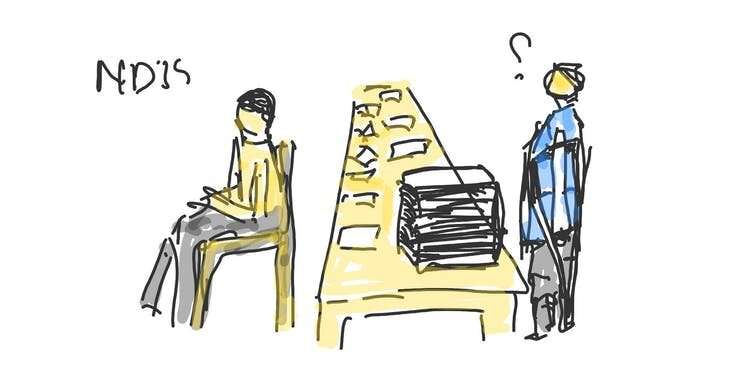Small changes could bridge communication and cultural gaps for refugees who need disability support

People with disability and their family members from non-English speaking refugee backgrounds come up against language and communication barriers when they try to access services, including the National Disability Insurance Scheme (NDIS).
Some of these barriers are experienced by all migrants from non-English speaking backgrounds. But this group's issues are further compounded by services that operate in isolation and don't recognize diversity.
In one corner: adult migrant English programs that don't routinely accommodate for disability. In the other: disability services that don't necessarily recognize or address cultural and language barriers. This means many people with disability and family members from refugee backgrounds are excluded from, or not able to easily access, the support they need.
What are the barriers?
Across a number of projects over the past five years, we partnered with refugee and disability support services in Victoria and New South Wales, along with academics from UNSW Sydney. We've spoken with over 50 people with disability and family members from Syrian and Iraqi refugee backgrounds about their experiences of accessing services such as the NDIS.
A lack of English language skills was universally identified as a significant barrier.
People with disability and family members from refugee backgrounds, many of whom have been living in Australia for up to 10 years, may have little spoken or written English.
People with disability report adult migrant English programs are too fast-paced and sessions too short to accommodate their disability needs. "Girgis" (not his real name), is deaf and has an acquired brain injury. He arrived in Australia as a refugee from Syria five years ago. Girgis explained: "I don't know English. English is too difficult for me. I had a fall [when I was young] and I injured my head at the back of my head, which means that I can't learn much anymore and study would be too hard for me."
"Hana," who cares for an adult son with an intellectual disability, also arrived from Syria five years ago. She told us: "My English is not good because I didn't go to school [to learn English] because I'm stuck at home "with [my son] all the time."
When limited English meets the system
Having limited English is compounded by a complex disability and health service system that doesn't have enough interpreters. People with disabilities and family members are often confused about what the NDIS is and how they can access it. Research fellow and disability advocate, Mahmoud Murad noted: "We [people with disability from refugee backgrounds] need time to understand. It took me two or three years to understand what is the meaning of NDIS."
"Farid," a man with a physical disability, who arrived in Australia four years ago described the ad hoc nature in which he learnt about the NDIS.
"No one told me that I was supposed to register with the NDIS until after they made an artificial organ for me in the hospital, a doctor there told me 'how you are not registered with the [NDIS]?'"
People want clear and concise information about the system in their own language. They want to be supported by someone who speaks their language through the process of applying for and getting disability support.
Specific communication and cultural gaps
A major barrier people encounter when trying to get information about the NDIS and other services is that they can't search websites using languages other than English.
Many organizations, including the NDIS, publish online information in Arabic (and other languages) but to find this information people need to be able to search using English words.
Disability service providers lack awareness of how to accommodate people with disability and family members who do not speak English.
And service providers are largely unaware of the often traumatic experiences of people from refugee backgrounds. In addition, they are uninformed about the cultural stigma around disability experienced by this group. Cultural disability stigma can mean people do not seek or use disability services.
"Ajmal" told us: "I mean, we left our country and were displaced and lost all our homes, and we will find some negligent [disability service provider] employees who do not feel your feelings."
Start with a bilingual workforce
Refugee support services are the first point of contact for people from refugee backgrounds.
This year marks ten years since the Australian government introduced a health waiver which exempted people applying for humanitarian visas from having the ongoing costs of health care assessed as part of their application.
The waiver meant people with disability could come to Australia as refugees for the first time. Some refugee support services responded by employing staff with disability expertise to work alongside bilingual workers.
Similarly, the disability sector could build a bilingual workforce and promote their services in languages other than English. To improve access to information, NDIS and disability service provider websites must include information in languages other than English and must facilitate site searches in multiple languages.
NDIS plans must be routinely translated into the person's language, this often does not happen unless people know to ask for it.
These simple changes would make a huge difference for people with disability and family members from non-English speaking refugee and migrant backgrounds.
Provided by The Conversation
This article is republished from The Conversation under a Creative Commons license. Read the original article.![]()



















